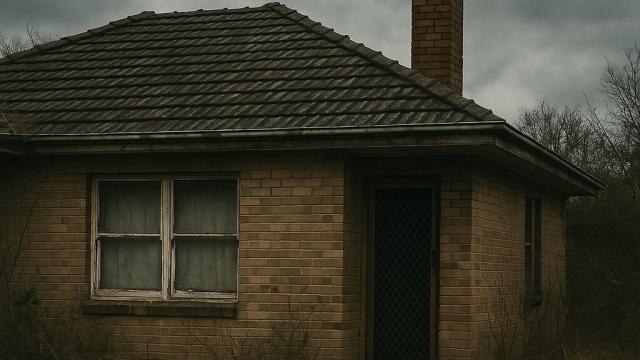
Image: ChatGPT
Online via Zoom, please contact Monique Rooney for the link.
This paper introduces a book I’m planning, a sort of belated ‘sequel’ to the much earlier co-authored Uncanny Australia (1998). My focus is on the so-called 'housing' crisis and I shall argue that even as Australia imagines itself as a home owning nation and casts this as a mutually shared ‘dream’, nevertheless it turns home ownership into a near- or complete impossibility – and routinely flips inhabitation into its traumatic opposite. My epigraph for the book comes from Rosie Cox and Victor Buckli: ‘home is where people are made and undone’.
I begin by looking at the aftermath of the iconic Strathmore house in The Castle (1997), a film that gave cinematic affirmation to John Howard’s remark from the same year: ‘I believe that the concept of home is a compelling notion in our psyche’. But I look instead at the unhomely in Australia. I draw on Mark Fisher’s use of the term weird to describe ‘that which does not belong’ where it is, even as it makes itself at home there. (This is a social logic of colonisation.) I then look at ‘inhospitable’ houses in three horror Australian horror films, 13 Gantry Row (1998), The Babadook (2014), and Bring Her Back (2025). I also look at Helen Garner’s The Spare Room (2008), a narrative that plays itself out in the long arc of Pauline Hanson’s infamous maiden speech to Parliament (‘If I can invite whom I want into my home’, etc.). Home infestation and home invasion narratives are therefore also important to this book. So is eviction, and so is homelessness; I look briefly at a form of ‘genteel homelessness’, house-sitting. Finally, I look at three recent texts about home renovation as melancholia: Virginia Lloyd’s The Young Widow’s Book of Home Improvements (2008), Amanda Lohrey’s The Conversion (2023), and Melanie Cheng’s The Burrow (2023).
Speaker bio:
Ken Gelder is an Emeritus Professor of English, University of Melbourne. His books include Uncanny Australia: Sacredness and Identity in a Postcolonial Nation (Melbourne UP 1998, with Jane M. Jacobs), Popular Fiction: The Logics and Practices of a Literary Field (Routledge 2004), Subcultures: Cultural Histories and Social Practice (Routledge 2007), and New Vampire Cinema (BFI 2014). With Rachael Weaver, he is co-author of Colonial Australian Fiction: Character Types, Social Formations and the Colonial Economy (Sydney UP 2017), The Colonial Kangaroo Hunt (Melbourne UP 2020) and, most recently, Colonial Adventure (Melbourne UP 2024) – the first book in a new series with MUP on Colonial Australian Culture.
Presented as part of the 2025 Centre For Australian Literary Cultures (CALC) seminar series.
Location
Speakers
- Ken Gelder, University of Melbourne
Event Series
Contact
- Monique Rooney